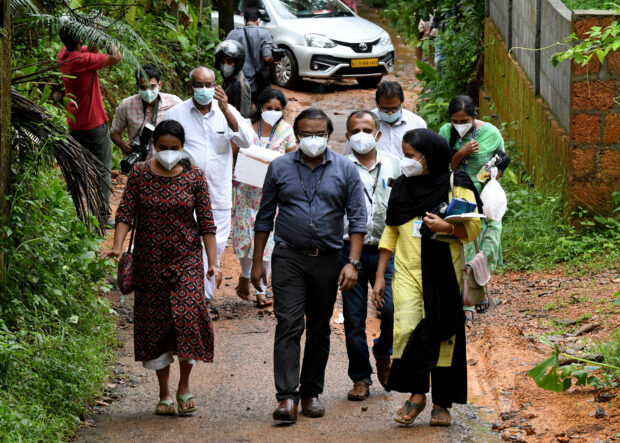Nipah virus: Over 700 tested after two deaths in India

Members of a medical team from Kozhikode Medical College carry areca nut and guava fruit samples to conduct tests for Nipah virus in Maruthonkara village in Kozhikode district, Kerala, India, September 13, 2023. REUTERS/Stringer
NEW DELHI — The southern Indian state of Kerala shut some schools, offices and public transport on Wednesday in a race to stop the spread of the rare and deadly Nipah virus, which has killed two people.
Two adults and a child were still infected in the hospital, and more than 700 people were being tested for the virus, spread via contact with the bodily fluids of infected bats, pigs, or people, a state health official said.
The state government on Wednesday evening said at least 706 people, including 153 health workers, were undergoing tests to check the spread of the virus. Results were awaited.
“More people could be tested …Isolation facilities will be provided,” Pinarayi Vijayan, chief minister of Kerala, said in a statement. He asked people to avoid public gatherings in the Kozhikode district for 10 days.
Two infected people have died since Aug. 30 in Kerala’s fourth virus outbreak since 2018, forcing authorities to declare containment zones in at least eight Kozhikode villages.
“We are focusing on tracing contacts of infected persons early and isolating anyone with symptoms,” state Health Minister Veena George told reporters.
She said the virus detected in Kerala was the same as found in Bangladesh, a strain that spreads from human to human with a high mortality rate but has a history of being less infectious.
“Public movement has been restricted in parts of the state to contain the medical crisis,” she said, adding that state epidemiologists were using antivirals and monoclonal antibodies to treat three people infected, including a medical worker.
Strict isolation rules have been adopted, with medical staff being quarantined after contact with the infected.
The first victim was a small landholder growing bananas and areca nuts in the Kozhikode village of Maruthonkara, said a government official who retraced the movement of that person to track down all people he could have interacted with and the places he visited before his health started to deteriorate.
The victim’s daughter and brother-in-law, both infected, are in an isolation ward while other family members and neighbors are being tested.
The second death followed contact in the hospital with the first victim, an initial investigation has shown, but the two were not related, added the official, who sought anonymity as he was not authorized to talk to the media.
The Nipah virus was first identified in 1999 during an illness outbreak among pig farmers and others in close contact with the animals in Malaysia and Singapore.
Outbreaks are sporadic, and previous infections in South Asia have occurred when people drank date-palm sap contaminated with bat excreta.
The first victim’s native village, Maruthonkara, is situated near a 300-acre forest home to several bat species. During the 2018 Nipah outbreak, fruit bats from the same area tested positive for the virus.
In Kerala’s first Nipah outbreak, 21 of the 23 people infected died. Outbreaks in 2019 and 2021 killed two people.
Neighboring Tamil Nadu state announced that travelers from Kerala would be subjected to medical tests and those with flu symptoms would be isolated.
A Reuters investigation in May identified parts of Kerala as among the places most at risk globally for outbreaks of bat viruses, especially as extensive deforestation and urbanization have brought people and wildlife into closer contact.